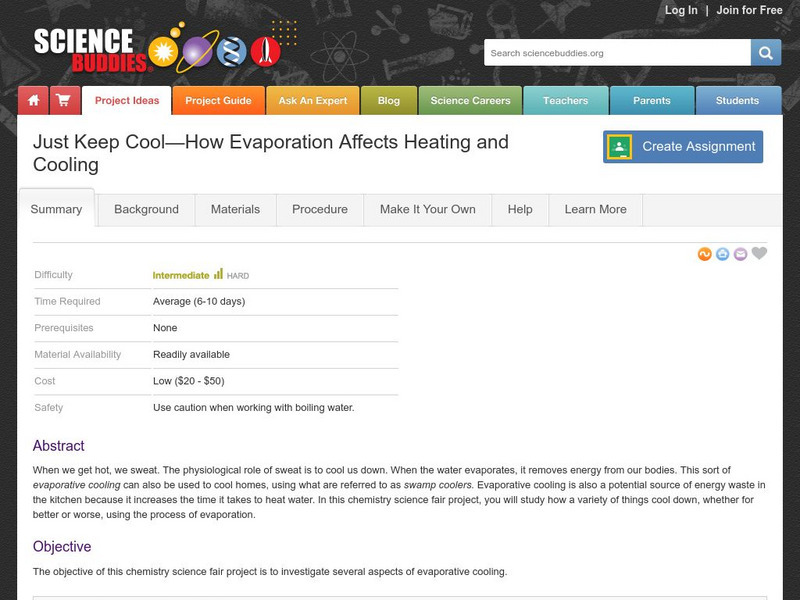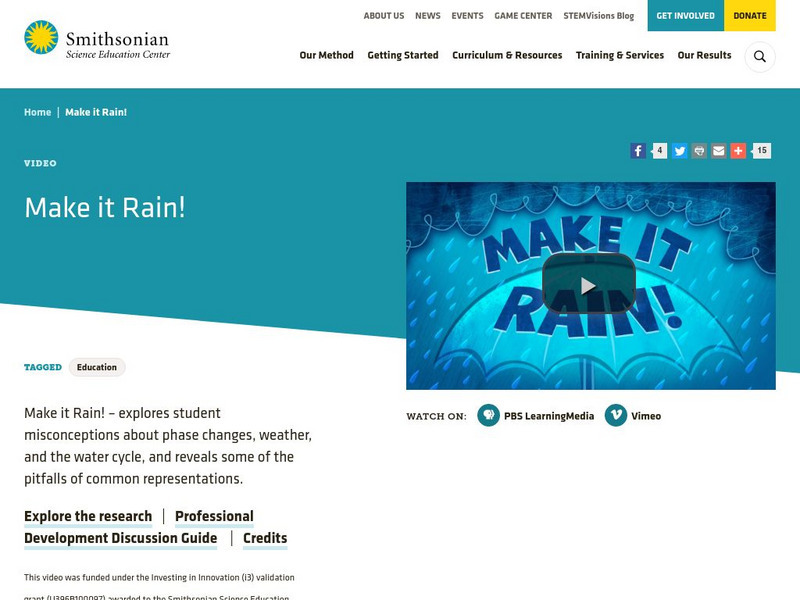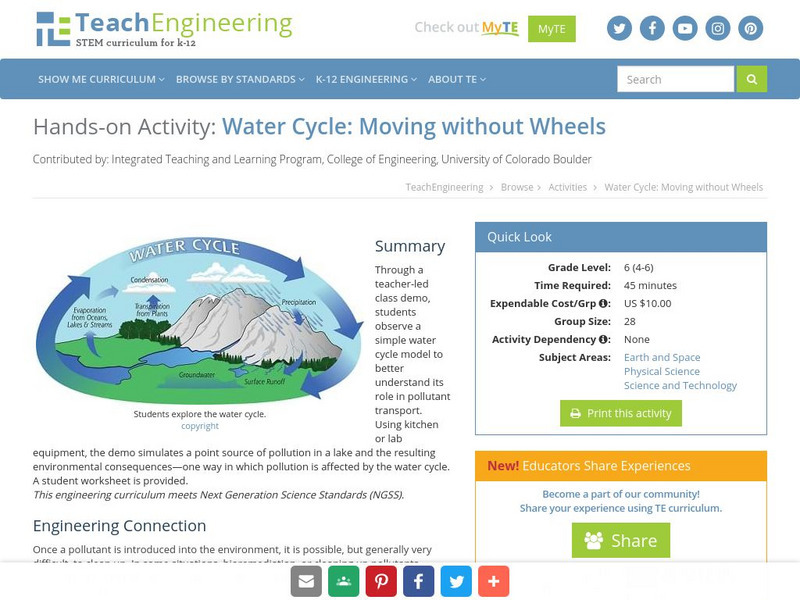PBS
Pbs Learning Media: Earth's Water Movements
The paths that water can take through Earth's systems are many and complex. Examine the following diagram from NASA depicting the water cycle. Studying the water cycle is important because changes in the water cycle affect all parts of...
Read Works
Read Works: We Need Water
[Free Registration/Login Required] Students read about the water cycle and the importance of water. A question sheet is available to help students build skills in cause and effect.
Missouri Botanical Garden
Missouri Botanical Garden: The Water Cycle
This simple overview provides definitions of key terms in the water cycle and a diagram showing the path water takes in this cycle.
TeachEngineering
Teach Engineering: Ocean Water Desalination
Students learn about the techniques engineers have developed for changing ocean water into drinking water, including thermal and membrane desalination. They begin by reviewing the components of the natural water cycle. They see how...
CK-12 Foundation
Ck 12: Fifth Grade Science: Earth Science: Water on Earth
[Free Registration/Login may be required to access all resource tools.] Discusses water and where it occurs on Earth, gives an overview of the water cycle, and explains how the ocean is an integral part of the water cycle and is...
CPALMS
Florida State University Cpalms: Florida Students: Water in Our World
Discover the processes of the water cycle and learn about its effect on weather and climate.
TeachEngineering
Teach Engineering: Witnessing Evaporation
The engineers at Splash Engineering (the students) have been commissioned by Thirsty County to conduct a study of evaporation and transpiration in their region. During one week, students observe and measure (by weight) the ongoing...
Math Science Nucleus
Math/science Nucleus: Drippy Water Cycle Animation
This animation discusses the water cycle in a storybook format using the character Drippy. All the stages of the water cycle are covered.
Other
New Jersey Section of the American Water Works Association: The Water Cycle
Simple diagram and explanations of the water cycle and related terms.
Science Education Resource Center at Carleton College
Serc: Mn Step: Water Cycle: Investigating Condensation
Young scholars will listen to a story about the water cycle, observe how water droplets form on a glass of icy water, then draw and label a picture showing condensation.
US Environmental Protection Agency
Epa: The Water Cycle [Pdf]
An illustrated diagram of the water cycle that students can use for study.
Science Education Resource Center at Carleton College
Serc: Mn Step: Weather/water Cycle
In this activity, students will learn about the water cycle through a story, a song, and a game, and relate it to the weather that they observe.
ClassFlow
Class Flow: Water Cycle
[Free Registration/Login Required] This is a science flipchart that reviews the stages of the water cycle and also ways in which the water cycle affects weather such as hurricanes and tornadoes.
ClassFlow
Class Flow: The Water Cycle
[Free Registration/Login Required] This lesson covers information for middle grade students relative to the basic functions of the water cycle.
ClassFlow
Class Flow: Water Cycle
[Free Registration/Login Required] In this lesson students study the phases of the water cycle.
ClassFlow
Class Flow: Water Cycle
[Free Registration/Login Required] This is an activity flipchart that asks students to label the various phases of the water cycle.
ClassFlow
Class Flow: Water Cycle
[Free Registration/Login Required] Using this flipchart students study the phases of the water cycle and its importance to the earth. Assessment questions use Activotes.
Science Struck
Science Struck: Water Cycle: An Easy Explanation for Kids
Provides a simple explanation of the water cycle by describing four main stages - evaporation, condensation, precipitation, and collection. Includes three project ideas and some interesting facts.
Science Struck
Science Struck: Water Cycle Diagram
Describes the four main stages of the water cycle - evaporation, condensation, precipitation, and collection.
Science Buddies
Science Buddies: Just Keep Cool How Evaporation Affects Heating and Cooling
When we get hot, we sweat. The physiological role of sweat is to cool us down. When the water evaporates, it removes energy from our bodies. This sort of evaporative cooling can also be used to cool homes, using what are referred to as...
Smithsonian Institution
Smithsonian Science Education Center: Make It Rain
How do you show students that the water cycle is more than just the traditional model of the ocean, clouds, and mountains and actually a part of their daily lives? This video will show multiple models of different part of the water cycle...
TeachEngineering
Teach Engineering: Moving Without Wheels
In a class demonstration, students observe a simple water cycle model to better understand its role in pollutant transport. This activity shows one way in which pollution is affected by the water cycle; it simulates a point source of...
American Chemical Society
Middle School Chemistry: Changing State: Condensation
Students investigate water cycle processes by testing how cooling affects the rate of condensation of water vapor.



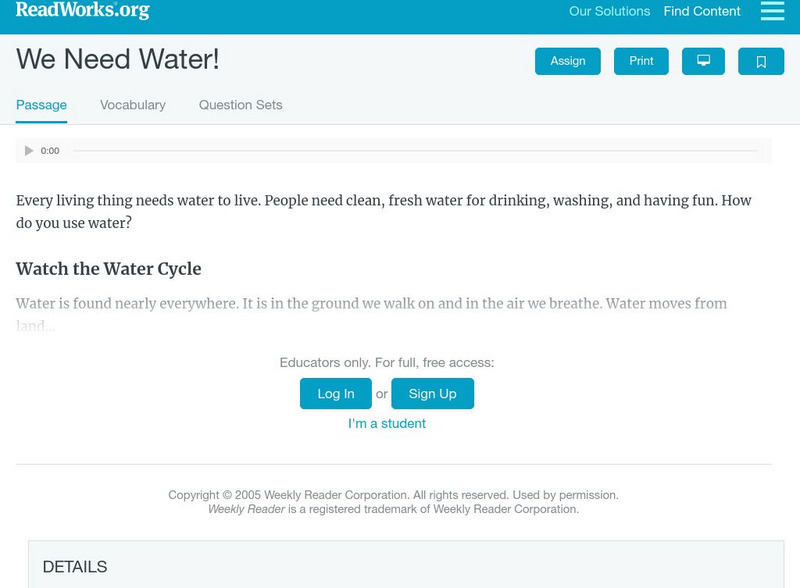


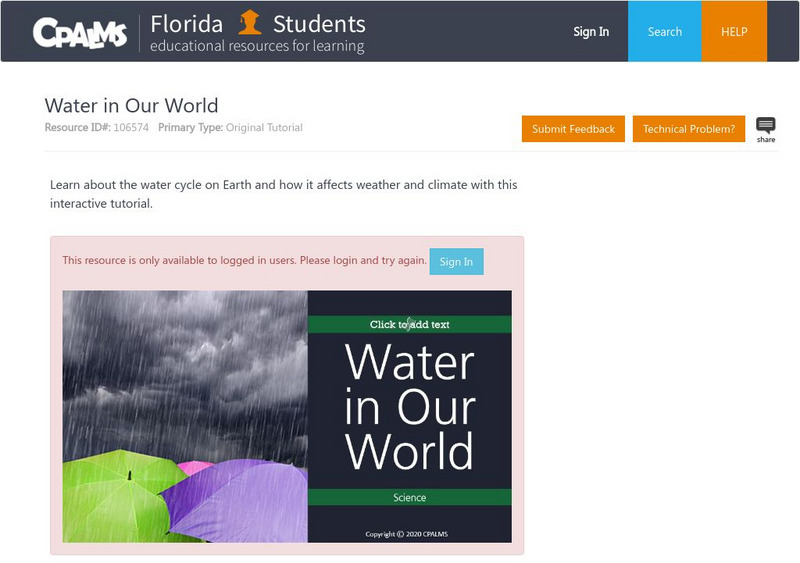


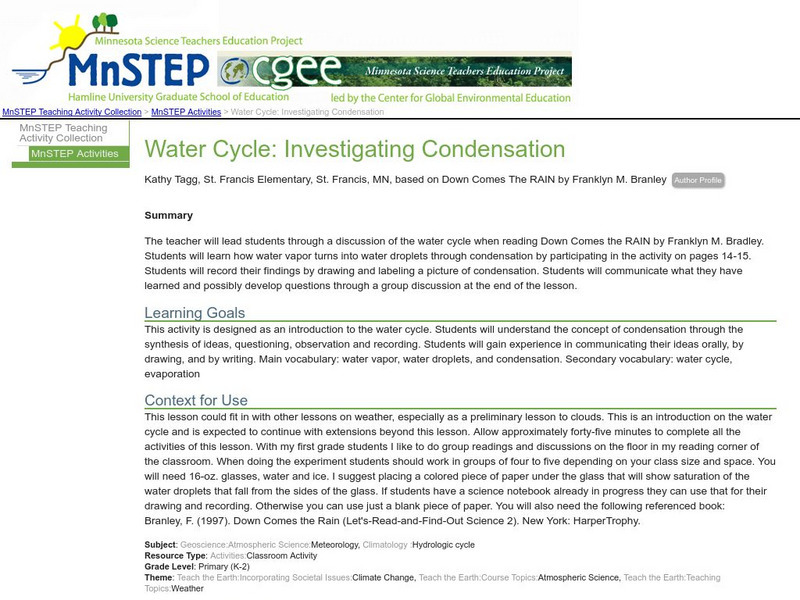
![Epa: The Water Cycle [Pdf] Graphic Epa: The Water Cycle [Pdf] Graphic](https://content.lessonplanet.com/knovation/original/42176-ac4345d9392f3783430ed3628fd17cec.jpg?1661261553)







